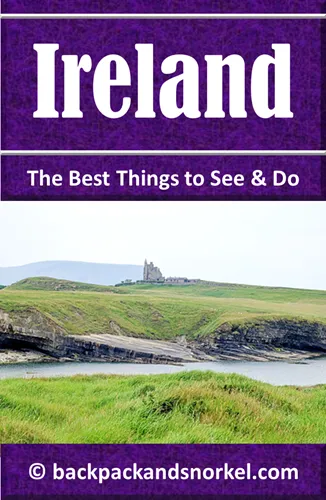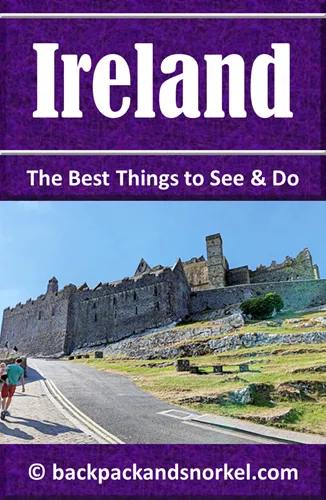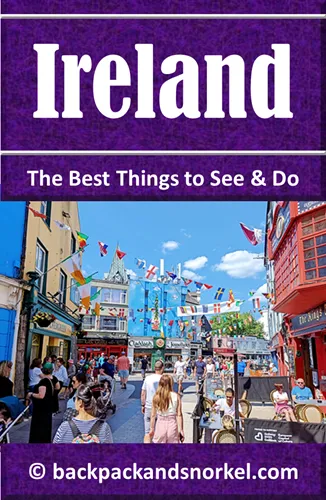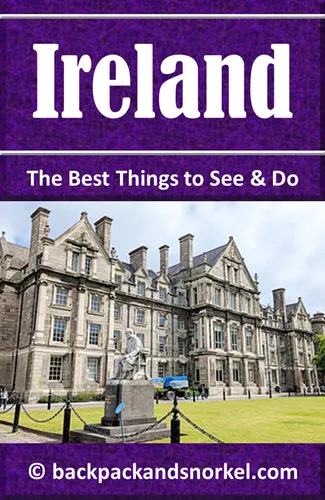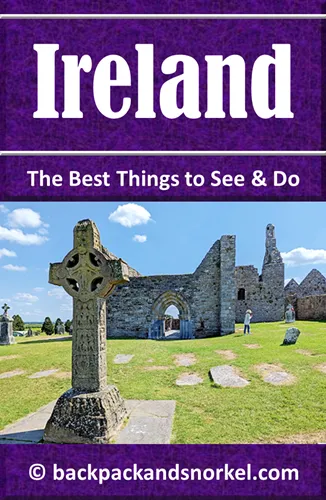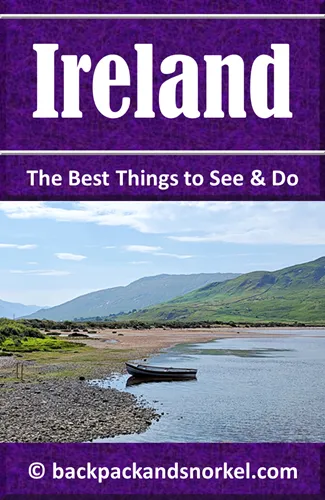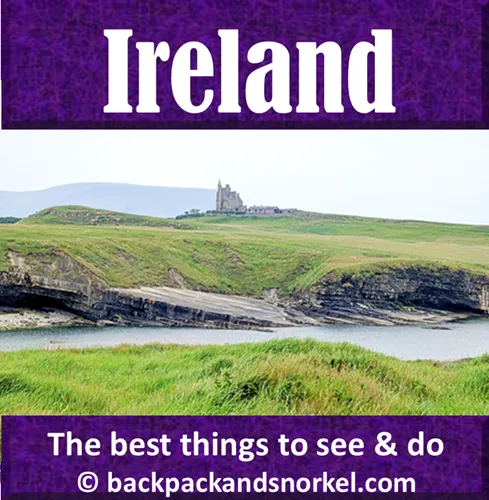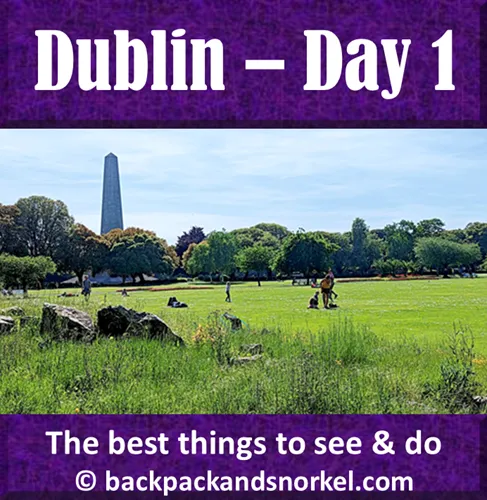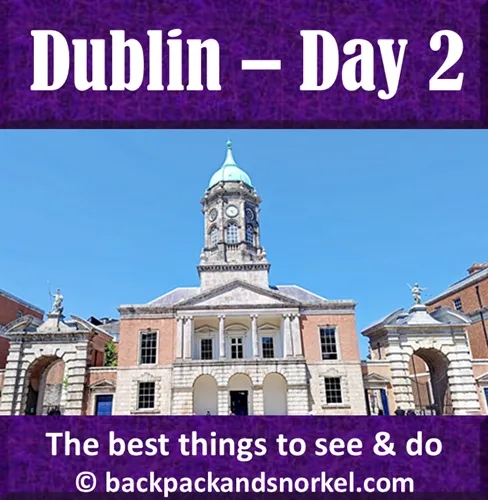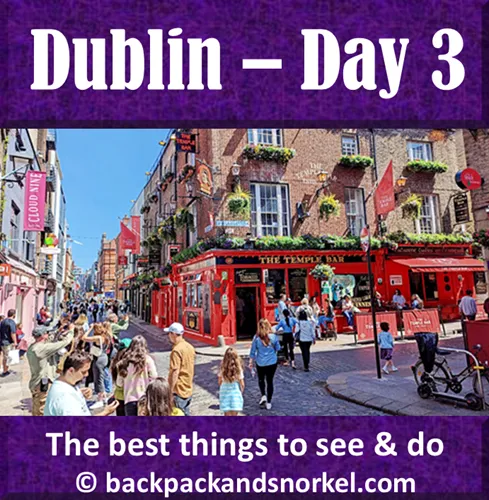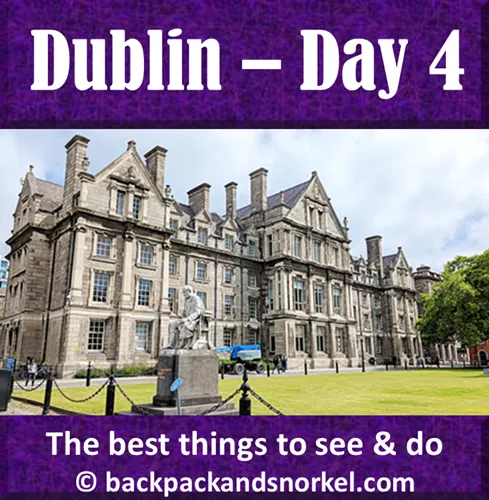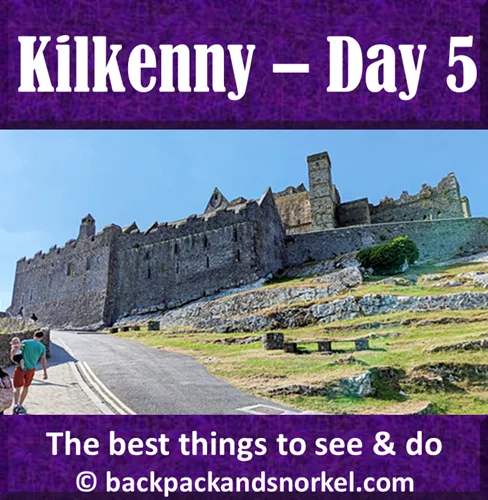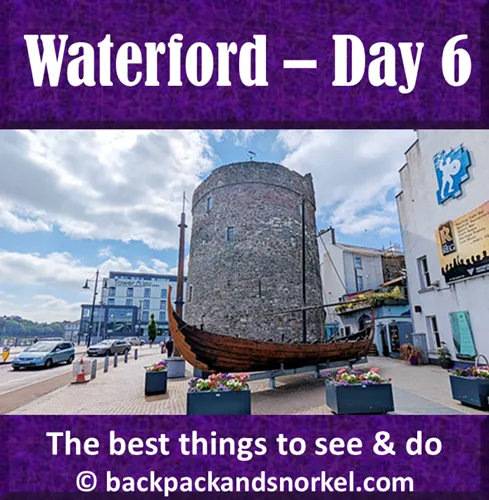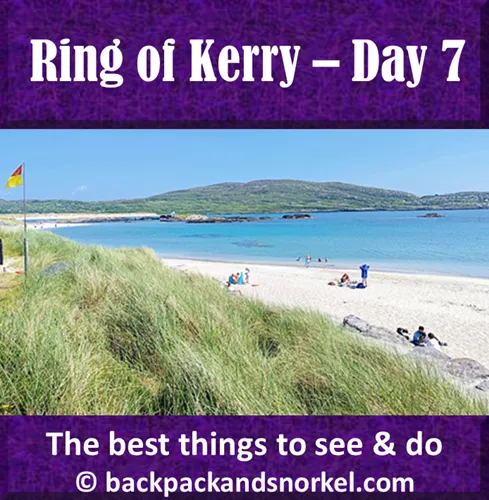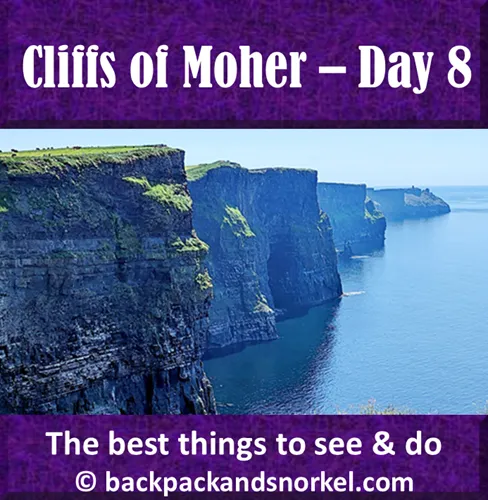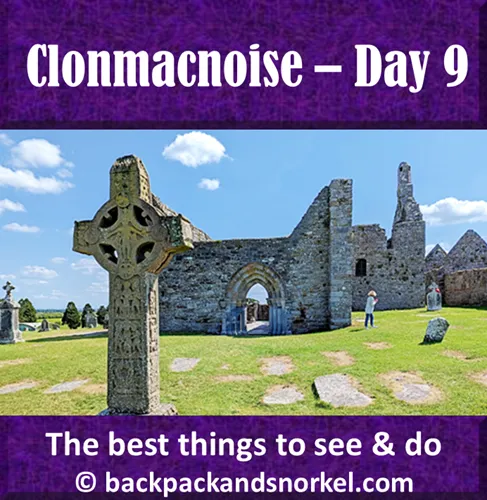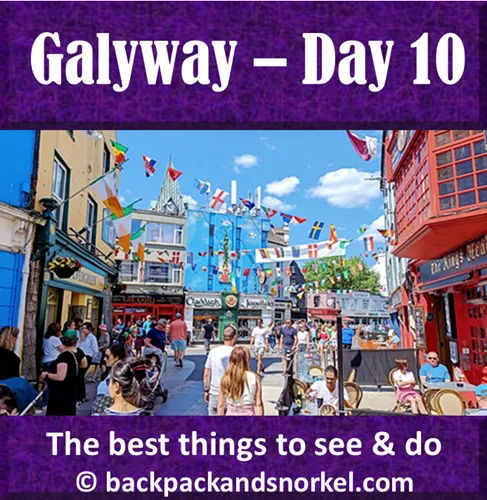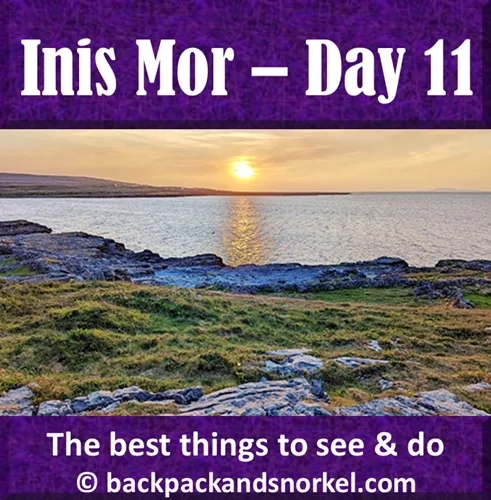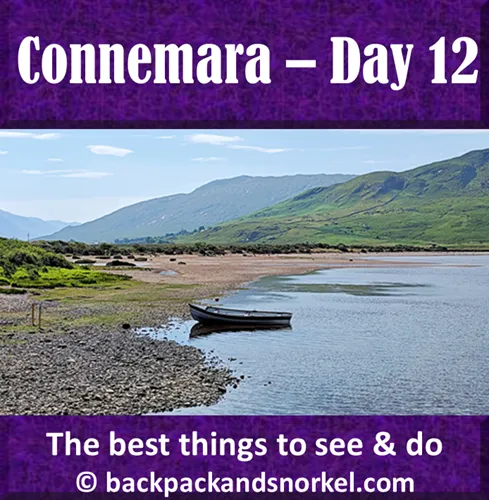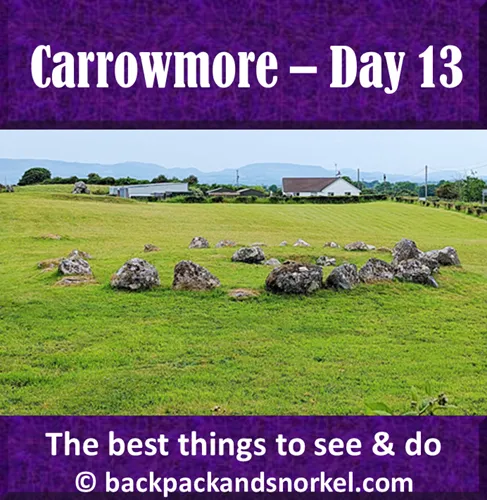Backpack and Snorkel Travel Guide for the highlights between Bunratty and Galway: Bunratty Castle, Cliffs of Moher, Burren National Park - Ireland Purple Travel Guide
Today we will visit Bunratty Castle, Cliffs of Moher, Burren National Park. We provide detailed information and the best things to see and we show lots of photos so you know what you can expect.
Your timing for today is determined by your entry ticket to the Cliffs of Moher. You need to buy a ticket to the cliffs in advance and it allows you to enter at a certain time. You can stay as long as you want, until they close, but you cannot enter outside of your time slot. Our advice is to go select a time slot in the early afternoon if you are OK with sharing the place with lots of other people. Otherwise, select an early morning time slot and go there first thing in the morning.
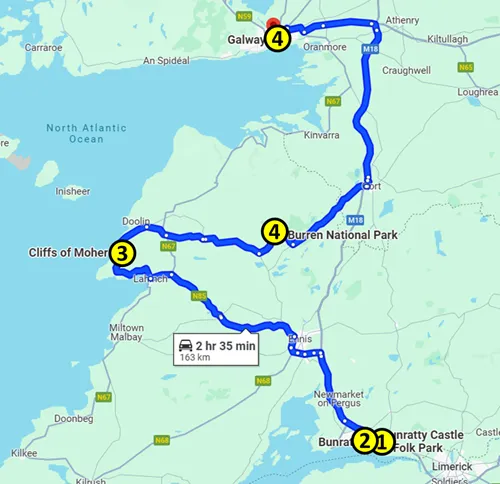
1 = Bunratty
2 = Bunratty Castle
3 = Cliffs of Moher
4 = Burren National Park
5 = Galway
Bunratty Castle
The castle that you see today is the 4th castle on this site, and was built in or shortly after 1425. The first castle was likely built here in 1251 out of wood.
Over time, Bunratty Castle developed into one of the most important strongholds of the kingdom of Limerick and it changed owners several times.
In the early 1800s, the owners moved out and let the castle fall into disrepair.
It took until 1956, until the castle was purchased and much needed repairs were made to prevent it from falling into ruins. In 1960, the castle was opened to the public.
Today, Bunratty Castle is the centerpiece of the larger Bunratty Castle and Folk Park which includes over 26 restored historic buildings with educational displays on 26 acres and is a popular tourist attraction.
The Folk Park village is built in 19th century style, and includes a school, doctor’s house, pawnbrokers, pub, drapery, printworks, grocery store, hardware shop, pottery shop, and a post office.
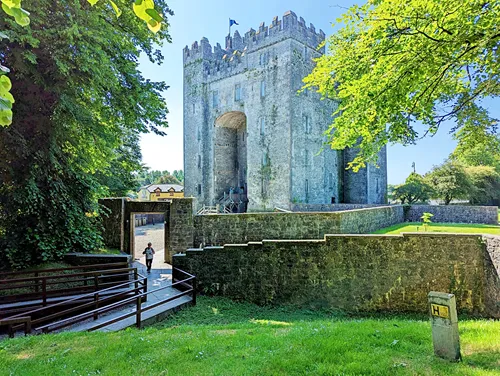
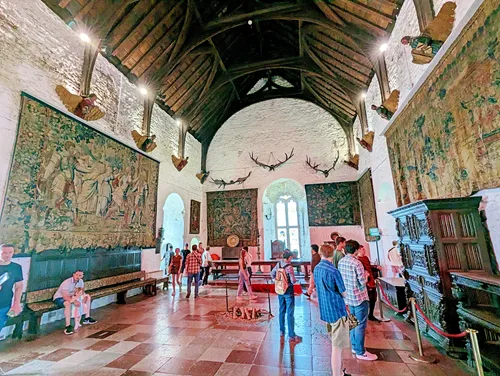
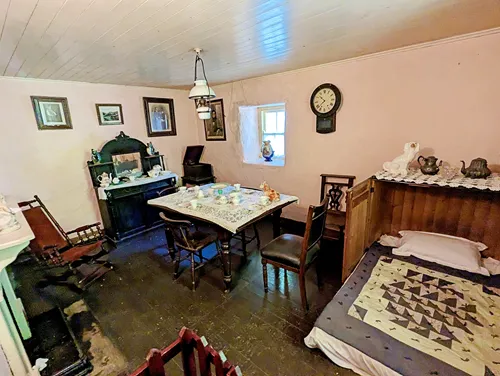
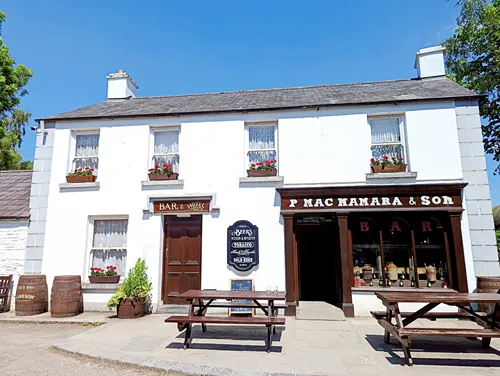
Cliffs of Moher
The Cliffs of Moher are Ireland’s most visited natural attraction. In 2022, 1,136,868 people visited the cliffs, of which 41% came from the USA, 29% from Ireland and 7% from the UK.
The visitor numbers are down from pre-pandemic levels of 1,580,010 visitors in 2018.
Due to the large visitor numbers, tickets are sold for specific entry times and you must arrive during the time slot you have purchased.
At the time of writing, there were 3 time slots per day with different prices:
- Off-Peak AM: 8am -10:59am - Euro 7 per person
- Peak times: 11am – 3:59pm - Euro 10 per person
- Off-Peak PM: 4pm – Close - Euro 8 per person
Closing times vary by month from 5pm (November – February) to 9pm (May – August) and 7pm for the rest of the year.
The name Cliffs of Moher comes from an old promontory fort that stood atop the cliffs where Moher Tower now stands (2.3 miles (3.7 km) south-west of O’Brien’s Tower.
The fort was called Moher or Mothar.
The fort is long gone and it is only certain that it existed in 1780 and that it was demolished in 1808.
From the parking lot, it is a 0.25 mile (400 m) 5-10 min walk to the cliffs. Most people make a right (north) turn towards O’Brien’s Tower as some of the best views of the cliffs can be seen from here.
As the cliffs are steep, it cannot be said enough: Please stay on the marked path, people have fallen to their deaths just to shoot an instagrammable photo.
The cliffs have a maximum height of 702 ft (214 m) above sea level and they formed about 313 - 326 million years ago, when a river dumped sand, silt, and clay into an ancient marine basin. Over millions of years, the sediments were compacted and transformed into the sandstone that you see today.
The ocean is slowly eroding the cliffs. The islet that you can see close to O’Brien’s Tower once was part of the mainland, but its connection was washed away by the ocean.
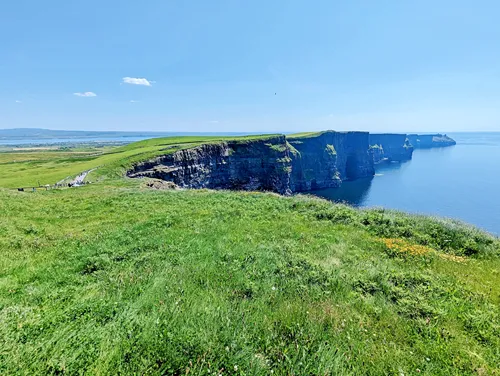
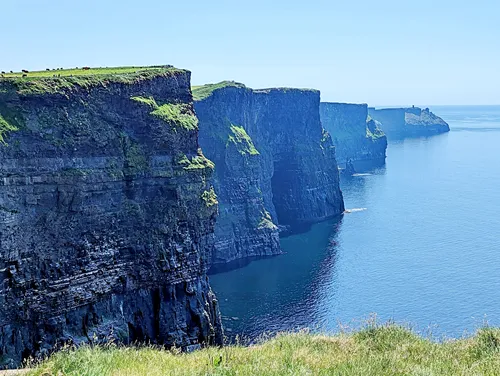
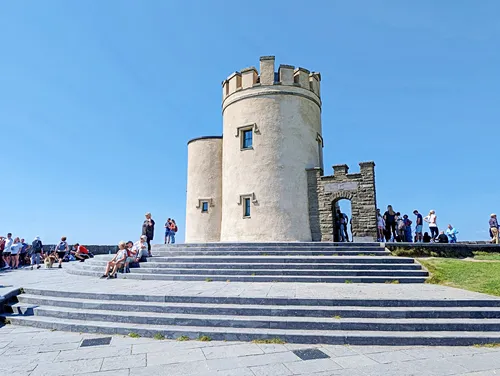
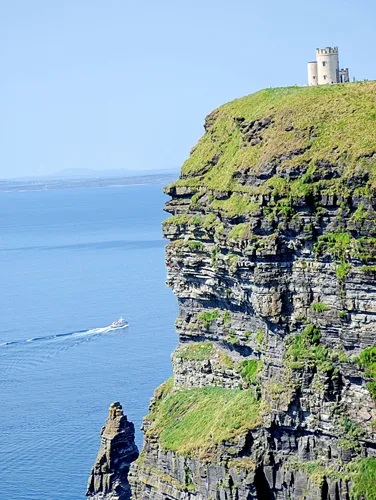
Burren National Park
Burren National Park is the smallest of Ireland's six national parks. On 3,700 acres (1500 ha), the park protects a small part of the karst landscape of the Burren, including mountains, bogs, heaths, grasslands, and forests.
The park is open 24/7 and there is no admission fee. There are no services and no restrooms in the park.
Be advised that the roads in this park are very narrow, and many roads are not paved.
There are 8 maintained hiking trails in the park that start at one of the three small parking areas (P1 - P3) in the park. We really liked the white trail.
| Trail | Start / End | Distance mi (km) | Ascent ft (m) | Time | Difficulty |
| White Arrow / Nature Trail | P1 / P1 | 0.93 (1.5) | 66 (20) | 40 min | moderate |
| Orange Route / Knockaunroe Turlough | P1 / P1 | 0.8 (1.3) | 66 (20) | 30 min | moderate |
| Red Route / Mullaghmore Traverse | P1 / P2 | 3.7 (6) | 460 (140) | 3 h | difficult |
| Blue Route / Mullaghmore Loop | P1 / P1 | 4.7 (7.5) | 460 (140) | 3 h | difficult |
| Green Route / Mullaghmore Return | P1 / P1 | 4 (6.5) | 460 (140) | 2:45 h | difficult |
| Brown Route | P3 | 1.6 (2.5) | 49 (15) | 45 min | moderate |
| Yellow Route | P3 | 1.25 (2) | 131 (40) | 35 min | moderate |
| Pink Route | P3 | 0.6 (1) | 164 (50) | 15 min | moderate |
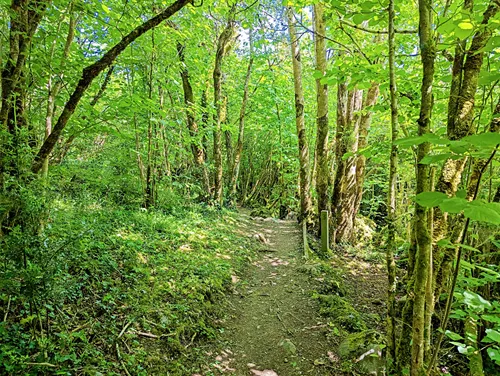
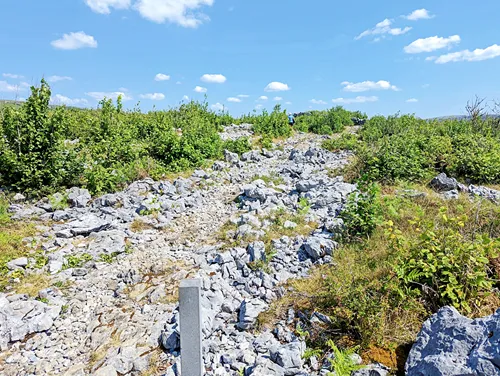
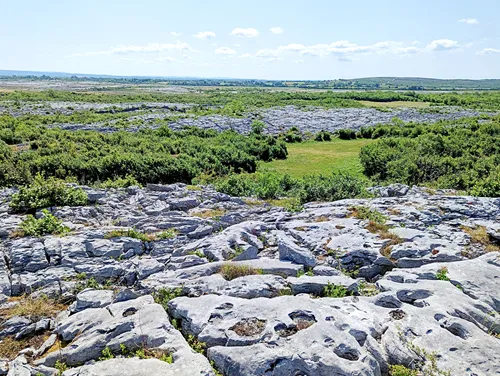
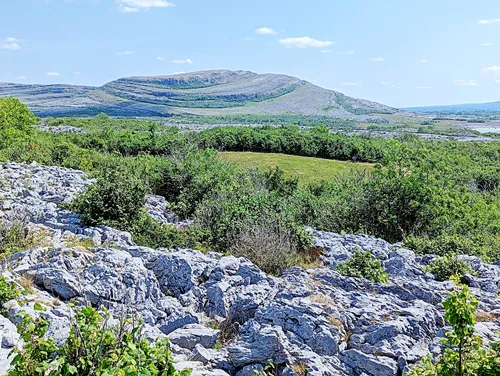
Where to stay in Galway
With a population of 86,000 people, Galway is the largest city in Ireland’s Connacht province.
The city grew around a fortification that was built here in 1124. Today, the city is home to historic buildings, churches, city gates and cemeteries that can be visited.
Here is the accommodation that is available when you visit:
Where do you want to go now?
Author: Rudy at Backpack and Snorkel
Bio: Owner of Backpack and Snorkel Travel Guides. We create in-depth guides to help you plan unforgettable vacations around the world.
Other popular Purple Travel Guides you may be interested in:
Like this Backpack and Snorkel Purple Travel Guide? Pin these for later:
